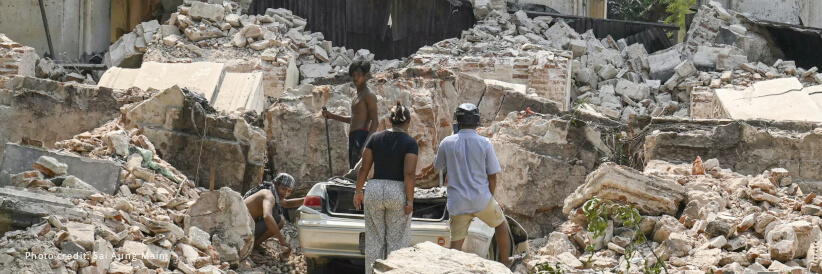Humanitarian efforts are intensifying despite difficult conditions in Myanmar. IFRC rapid response teams and specialists have joined hundreds of staff and volunteers from the Myanmar Red Cross during what is normally the country’s most joyful time.
On the ground, conditions are challenging. It has been raining heavily, flooding streets and camps, and more downpours are forecast. There have also been over 400 aftershocks, one of which registered 5.5 on the Richter scale and caused buildings to collapse in Mandalay City and the surrounding areas. Temperatures have reached forty degrees Celsius and the start of the monsoon season is only weeks away.
The Thingyan festival, which started on Tuesday, normally celebrates Myanmar’s new year with water-splashing rituals, symbolizing cleansing and renewal. Instead, those worst affected by the earthquake continue to live in the open, close to the ruins of their homes, schools, and hundreds of pagodas, monasteries, churches,s and mosques reduced to rubble. Aftershocks are causing widespread fear. As a result, hundreds of families continue to live outside their homes, fearing the remaining buildings may collapse.
The Myanmar Red Cross Society (MRCS), alongside IFRC and other National Societies, has been on the ground across Sagaing, Mandalay, Naypyidaw, Bago and Southern Shan, to distribute prepositioned supplies that were already in the country while new supplies are being dispatched. They are providing shelter, food, safe drinking water, relief items specific to young children and pregnant or lactating women, hygiene items, kitchen sets, mosquito nets, and health care through mobile health clinics and psychosocial support.
A humanitarian airbridge from Kuala Lumpur has also enabled the Red Cross and its partners to coordinate and facilitate the provision of 150 metric tonnes of additional supplies. In the first week since the earthquake, eight charter flights and six cargo shipments – equivalent to 50 fully loaded trucks and a convoy stretching over 1.2 kilometers – were facilitated. Since, a total of 150 metric tonnes of goods, including hygiene kits, jerry cans, tents, tarpaulins, blankets, and mosquito nets have arrived in the country
“Since the first hours of this response, generous individuals, national actors, and those who are part of the affected communities have provided the most impactful and rapid support. What I am witnessing is an extraordinary spirit of solidarity and humanity where organizations such as the Myanmar Red Cross and their incredible volunteers are working flat out to ensure needs are met, as fast as possible. This is normally a time for celebrations. Instead, it is a time of mourning and loss. The energy, selfless dedication, and determination of these individuals and humanitarian workers are a beacon of hope to these communities who have lost everything,” said Nadia Khoury, IFRC Head of Delegation for Myanmar. She is currently with the IFRC and Myanmar Red Cross rapid response teams and local volunteers in Mandalay and Sagaing regions.

